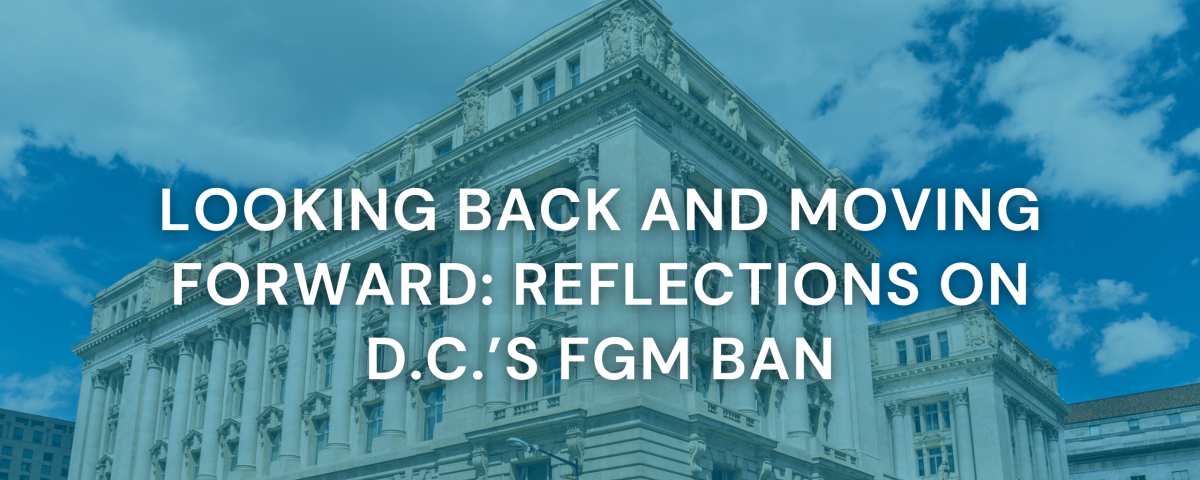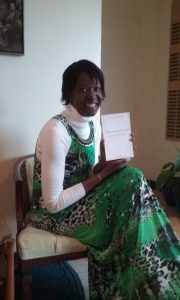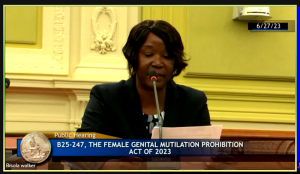Looking Back and Moving Forward: Reflections on D.C.’s FGM Ban

May 12, 2025
A survivor’s voice was at the heart of shaping D.C.’s landmark anti-FGM bill, which officially went into effect last month. Ngoltoingar Chantal Bayor, an advocate from Chad, brought a deeply personal and urgent testimony—one rooted in her own experience and the devastating loss of her 12-year-old daughter to birth complications caused by FGM. Bayor’s powerful words helped drive this legislation forward, alongside AHA’s relentless six-year campaign to make D.C. one of the safest places in the nation for women and girls.
Along with Bayor and AHA, Senator Michael D. Brown also testified live, championing the bill, joining many others who submitted written testimony to reinforce the urgent need for change.
Following this historic victory, we reached out to Bayor and Senator Brown to hear their reflections—what drove their advocacy, what this achievement means, and how it strengthens the broader fight to end FGM.
Conversation with Ngoltoingar Chantal Bayor
AHA Foundation: You underwent FGM when you were 11 years old in Chad and were threatened with death by those who performed the procedure if you spoke about it. Despite this intimidation, you not only found the courage to share your story but also played a significant role in advocating for legislative change in Washington, D.C. How did you manage to overcome the fear and pressure to remain silent?

Ngoltoingar Chantal Bayor with her book “Darkness under the Sun: Child Abuse-crime: Female Genital Mutilation (FGM/C)”
Bayor: I found strength in sharing my stories in English and French and advocating for change. I also empower local communities to take ownership of the fight against FGM. I have distributed more than 500 copies of my books, which have helped thousands of girls avoid the practice. I have attended conferences online and in person, raising awareness, educating people about the harmful effects of FGM, and promoting understanding and empathy. I have worked with organizations, governments, and individuals to develop effective strategies to end FGM.
AHA Foundation: Your testimony was crucial in shaping one of the strongest anti-FGM laws in the nation. What does this victory in D.C. mean to you personally as a survivor and advocate?
Bayor: The victory of shaping one of the strongest anti-FGM laws in the nation means that, as a survivor, my experience has contributed to meaningful change—a powerful source of validation and empowerment. It represents real protection for future generations because effective laws and policies can help protect girls and women from undergoing FGM, ensuring they have better health, education, and life opportunities. This victory can be a crucial step toward a broader movement to end FGM globally, inspiring others to act and advocate for change.”
“By speaking out, I hope to inspire a ripple effect of advocacy and activism, ultimately contributing to a world where all individuals can live free from harm and exploitation. Through my voice and actions, I aim to inspire a movement that promotes human rights, dignity, and justice for all.”
AHA Foundation: What impact do you hope your voice will have in encouraging others to speak out and advocate for change?
Bayor: By sharing my story and advocating for change, I hope to inspire others to find their voice and speak out against harmful practices like FGM. I believe that sharing personal experiences can help break the silence and stigma surrounding FGM, encouraging others to do the same. My story can serve as a testament to the strength and resilience of survivors, empowering others to act and advocate for their rights.
By speaking out, I hope to inspire a ripple effect of advocacy and activism, ultimately contributing to a world where all individuals can live free from harm and exploitation. Through my voice and actions, I aim to inspire a movement that promotes human rights, dignity, and justice for all.
AHA Foundation: As a survivor, how do you think this new legislation will impact families facing cultural pressure to engage in FGM?

Ngoltoingar Chantal Bayor testifying before D.C. Councilmembers in support of legislation to ban FGM
Bayor: The new legislation can have a significant impact on families facing cultural pressure to engage in FGM. The law can serve as a deterrent and provide a safeguard for girls and women at risk of FGM. Legislation can help challenge and change cultural norms, promoting a shift towards abandoning the practice. The law can empower families to resist pressure and make informed decisions about their daughters’ well-being, promoting a culture of protection and prevention.
Effective implementation and enforcement of the legislation, combined with education and community engagement, can help bring about lasting change and protect future generations. I will use this example to advocate for girls in Chad and Africa.
AHA Foundation: What message would you like to share with other survivors of FGM who may feel silenced or afraid to speak out?
Bayor: To survivors who may feel silenced or afraid to speak out, I encourage you to find a safe way to share your message. I was afraid too—terrified that speaking up might cost me my life. Then I realized they could silence me, but they could never silence a book. So, I wrote my first book—and I didn’t die. I began talking, and I am still here. Healing, slowly getting better, and learning to overcome fear. It is important to find a safe way to speak. For me, it was the beginning of healing—and the first step toward saving another girl’s life.
“We need to work together to end FGM. We must find a way to support grassroots advocates and provide funding to survivors for health care, reparations, and mental health support. That will create a real change from survivors to the community.”
AHA Foundation: Reflecting on your journey as an advocate, what have been your most challenging and rewarding moments? How has this shaped your vision for future efforts to end FGM?
Bayor: Looking back on my journey as an advocate, the moments that stood out to me as the most challenging was to talk about the details of the practice. It was like opening a wound with a knife, but rewarding, as this law is effective in Washington, D.C. This country gave me shelter and education and now my daughter is vindicated.
AHA Foundation: How has this experience shaped your vision for future efforts to combat FGM?
Bayor: I am grateful for being part of this wonderful work. I feel equipped to help more survivors especially those from ages 0-25 and collaborate with lawmakers, organizations like AHA, and countries like Chad to end FGM and protect girls and women.
AHA Foundation: How did the support of allies—like AHA Foundation and lawmakers—help you amplify your voice and achieve this victory?
Bayor: I received a lot of emotional and financial support. Initiating, working hard to have a law in D.C. is the greatest support for me and all survivors, not only in D.C. but around the world. As a survivor, I say “THANK YOU.” I still need help to complete my master’s in human rights and be fully available to work.
AHA Foundation: What advice would you give to others seeking to build coalitions for change?
Bayor: We need to work together to end FGM. We must find a way to support grassroots advocates and provide funding to survivors for health care, reparations, and mental health support. That will create a real change from survivors to the community. If survivors are healed before (ages 0-20) getting married and being a mother, they will cut the link to this practice and we will end FGM. For me, healing and education are the best way to end FGM AS SOON AS POSSIBLE.
Reflections from Senator Michael D. Brown
AHA Foundation: What inspired you to support the fight against FGM, and how do you see your role as a federal legislator contributing to this cause?
Senator Brown: I was inspired to fight against FGM when I learned how widespread this barbaric ritual is worldwide. I must admit I knew nothing about the practice a few years ago when a friend asked me to talk about it on my weekly podcast. At first, I was reluctant because I felt awkward as a man discussing the issue on the internet. However, when I learned how many women are subjected to this abuse worldwide, I felt I had no choice but to get involved.
As an elected official when I found out that the practice was not banned in my hometown of Washington, D.C., the nation’s capital, I was outraged and decided I had to testify and stand up to end this horrible practice and make sure the women of the District of Columbia are protected from this violence against them forever.
“…I hope that national momentum can build from what we are doing here in Washington so that we can ban FGM nationwide and send a message to the world that abuse against women of any kind will not stand in America.”
AHA Foundation: What impact do you hope this bill will have on raising awareness and combating FGM in D.C. and across the U.S.?
Senator Brown: I hope this bill provides an example to the nine states where FGM is not banned and inspires their legislatures to do the right thing and proffer legislation to ban this heinous form of sexual abuse most often perpetrated against children and adolescents.
In addition, I hope that national momentum can build from what we are doing here in Washington so that we can ban FGM nationwide and send a message to the world that abuse against women of any kind will not stand in America.

